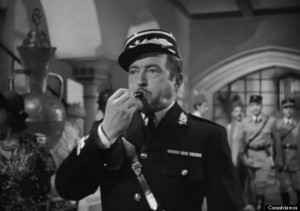For the last few years, Volkswagen has been putting significant effort into its Blue Motion campaign which publicized the groups environmental efforts and essentially made the point that modern diesel engines could compete with alternative fuel vehicles and even electric cars as offering a clean, green way to enjoy personal transportation. Comparing electric vehicles to diesel engines is complicated in any case and has a lot to do with the source of the electricity for the electric car and the performance of the conventionally powered vehicle.
For diesel engines, the issue is that pollution control has a direct impact on performance in terms of pick up, response and what is often called “driving pleasure”. VW’s solution, as reported by the Washington Post and others, was to program the cars to be ultra efficient when being tested and to be fun to drive when not.
Shocked
 Yesterday, Volkswagen’s CEO Martin Winterkorn resigned over the crisis although he insisted that he had done nothing wrong and was “shocked” that such a thing could happen in VW. The incident remains me of a scene in the classic film Casablanca when Captain Renault (Claude Reins) is ordered to shut down Rick’s and declares that he too is “shocked” that there was gambling going on in the cafe. (In the film Rick’s croupier then hands Renault his winnings from Roulette)
Yesterday, Volkswagen’s CEO Martin Winterkorn resigned over the crisis although he insisted that he had done nothing wrong and was “shocked” that such a thing could happen in VW. The incident remains me of a scene in the classic film Casablanca when Captain Renault (Claude Reins) is ordered to shut down Rick’s and declares that he too is “shocked” that there was gambling going on in the cafe. (In the film Rick’s croupier then hands Renault his winnings from Roulette)
Now personally I tend to believe that Mr. Winterkorn did not know about the software fix, but I do not think that gets him off the hook.
Different Strategies
In my view there are a number of different strategic approaches for business in dealing with the environment and the Volkswagen scandal illustrates two of them. The first is what I call Show and Tell and has to do with a company making a concerted effort to improve the environmental performance of its operations, products, and services i.e. going beyond compliance and then telling the world in a factual and clear way all that it is doing.
 Show and Tell is very different than greenwashing which is about covering up essentially poor environmental performance by spending money on carefully selected metrics and projects in order to give a greener image than a firm probably deserves. In my view Volkswagen has been making very important progress on a number of fronts and Blue Motion is in fact was good faith effort to get the word out.
Show and Tell is very different than greenwashing which is about covering up essentially poor environmental performance by spending money on carefully selected metrics and projects in order to give a greener image than a firm probably deserves. In my view Volkswagen has been making very important progress on a number of fronts and Blue Motion is in fact was good faith effort to get the word out.
The danger with Show and Tell is that if something does happen, such as the current scandal or a major accident, then the damage to a firm’s brand, reputation, or social license to operate can be enormous. This means that a firm should only pursue a Show and Tell strategy when it can be absolutely sure that its units will walk the talk in all cases and in all countries and territories in which it operates.
 A second strategy which is well illustrated by the scandal is what I call simply Break the Law. In Break the Law a firm’s management chooses to deliberately do less than the law requires or circumvent it. This is done either by Sr. Management to be directly involved in such a decision or by placing enough performance pressure on its operating units so that they may be tempted to cheat and also not putting in place sufficient control systems to make sure they do not.
A second strategy which is well illustrated by the scandal is what I call simply Break the Law. In Break the Law a firm’s management chooses to deliberately do less than the law requires or circumvent it. This is done either by Sr. Management to be directly involved in such a decision or by placing enough performance pressure on its operating units so that they may be tempted to cheat and also not putting in place sufficient control systems to make sure they do not.
My guess in this case, is that middle management knew that the only way to sell diesels in the US was to show how fast and zippy the new TDI engines could be when outfitted with common rail technology. At some point in the management structure someone thought that the likelihood of discovery was low enough and the upside potential high enough to develop and implement the software deception.
In this case, it is possible that Mr. Winterkorn and other members of the Sr. Management team unwittingly allowed Volkswagen to pursue a Break the Law strategy by placing unrealistic expectations on the acceptance of american consumers of fully compliant diesel engines. Interestingly enough, BMW, whose X5 passed the tests, relies more on gasoline powered cars in the U.S. market recognizing american’s distrust of diesel technology.


The primary goal should be to make the engines more efficient. This must not always mean, that they pass emission tests – but in the end they have to care for it in order to make the maintainance costs for the customers cheaper (in terms of taxing).
There is a lot of money going into “lowering emissions” today. This technology will will run out sooner or later, so it is a bit of wasted energy. I would rather see this money invested in some future proof technology like electric motors or – much more important – batteries or a replacement for those.
It may be a very wise decision to head for cars with an electric motor but powerd by a diesel-generator or something like this. Thing is: A generator don’t need to deliver torque on demand, so this will be the most efficient way to use it – there is a reason, why they use this approach in ships already.
i think the debate around the source of the electricity used in electrical cars as a argument to justify the continued use of diesel/petrol in cars is disingenuous. the greatest benefit of using electrically powered vehicles is centralizing pollution control at the source of electricity production